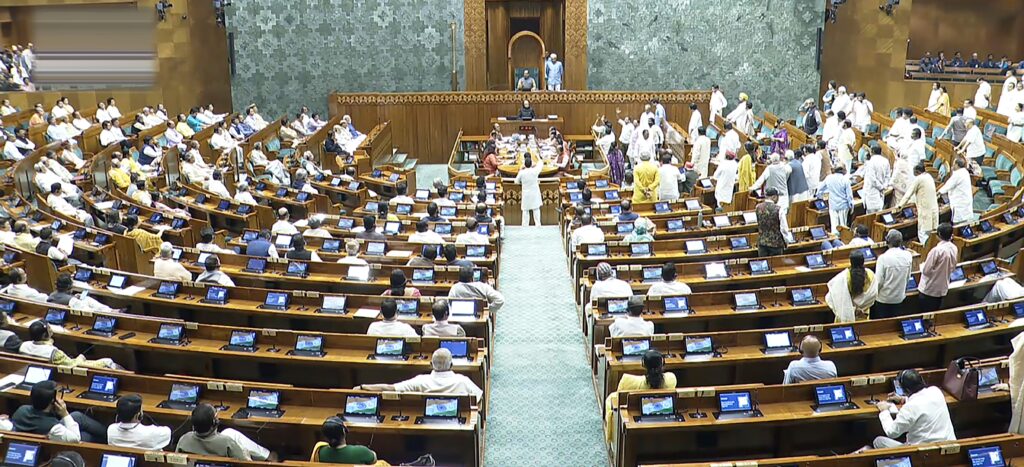Emphasising that “debate must take place in a democracy”, Union Home Minister Amit Shah on Sunday urged parliamentarians to introspect on the recent logjam in the House.
Shah said at the All India Speakers’ Conference in the capital that it was “not good if the House is not allowed to function in the name of the Opposition for someone’s narrow political gain”.
His comments came days after the Monsoon Session of Parliament, which saw little legislative business amid protests by the Opposition over the demand for a discussion on the Special Intensive Revision (SIR) of electoral rolls in poll-bound Bihar, concluded.
Framing his argument as a “matter of democratic health” and invoking the Mahabharata, Shah said, “When there is limited debate or discussion in Parliament, the contribution of the House in nation building gets affected. Whenever the dignity of the House is compromised, the country has seen dire consequences.”
While Shah’s appeal was solemn, parliamentary politics in the country has more often than not seen those in the Treasury benches advocate disruption-free proceedings. The BJP, while in the Opposition, wielded obstruction of proceedings not just as a tactic but as a principle.
The UPA years
In the UPA years, especially between 2005 and 2013, the BJP pioneered the very template of disruption it is now facing. Leading the charge were Arun Jaitley and Sushma Swaraj, the party’s Leaders of the Opposition in the Rajya Sabha and Lok Sabha, respectively.
When the oil-for-food scandal broke in 2005, the Winter Session was repeatedly disrupted, and the sustained pressure eventually forced then External Affairs Minister Natwar Singh to resign.
Through UPA-II, the story repeated itself. From A Raja and Dayanidhi Maran to Shashi Tharoor, P K Bansal, and Ashwani Kumar, ministerial resignations followed vociferous demands led by the BJP.
The Winter Session of 2010 was entirely washed out as the BJP made the constitution of a Joint Parliamentary Committee a precondition for allowing Parliament to function.
According to PRS Legislative Research, the 15th Lok Sabha (2009–14) ended up being the least productive in 50 years: it worked only 61% of its scheduled time, while the Rajya Sabha managed 66%.
‘A form of democracy’
Back then, disruption wasn’t just justified, it was celebrated as democracy in action. In September 2012, as the BJP disrupted the Monsoon Session over coal block allocations, Swaraj declared, “Not allowing Parliament to function is a form of democracy like any other form… If we had taken debate under Rule 184, they would have won because they have the numbers. Numbers do not give a licence to loot the country.”
Making the same argument repeatedly, she emphasised that obstruction was a legitimate counter to brute majority.
Jaitley took the logic further. Speaking in Ranchi in January 2011, he said: “Parliament’s job is to conduct discussions. But many a time, Parliament is used to ignoring issues and, in such situations, obstruction of Parliament is in the favour of democracy. Therefore, parliamentary obstruction is not undemocratic.”
In August 2012, amid the BJP’s offensive over coal block allocations, Jaitley told Times Now: “We are not interested in a debate. What is there to debate? We have had bad experiences in these discussions in the past with the 2G scam.”
Two days later, speaking outside Parliament, he sharpened his point: “There are occasions when obstruction in Parliament brings greater benefits to the country… Our strategy does not permit us to allow the government to use Parliament (for debate) without being held accountable… we do not want to give the government an escape route through debate.”
In an article in The Hindu the same month, he described obstructionism as a “weapon” to be used sparingly, but defended its use in moments of extraordinary scandal: “Parliamentary obstructionism should ordinarily be avoided. However, in the rarest of rare cases, obstructionism also brings its dividends.”
And after an entire session was lost to protests over the coal allocations, Jaitley doubled down: “One session of Parliament has earlier been lost on account of corruption in allotment of 2G spectrum. That helped this country cleanse the telecom sector. Hopefully, the long-term gains of this session may enable future governments to clean up the process of allocation of natural resources.”
For the BJP back then, obstruction wasn’t an unfortunate side effect of opposition politics but was a considered strategy, openly defended.

